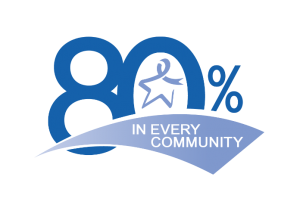National Colorectal Cancer Roundtable: 80% in Every Community
Posted on by
By Faye Wong, MPH
In 2015, working with CDC’s Colorectal Cancer Control Program became deeply personal when my sister-in-law died of colorectal cancer. Jan was age 56 when she died and she had been diagnosed with stage 4 colorectal cancer two years earlier. Like millions of people age 50 to 74 years, Jan had never been screened for colorectal cancer; in fact, she was in the age group (50 to 54 years) with the lowest U.S. rate of screening. Her colorectal cancer could have been prevented or detected early, when treatment is more effective. Jan could have been alive today.
CDC works to reduce the number of people that get colorectal cancer and the number of people that die from it through the Colorectal Cancer Control Program (CRCCP), the National Comprehensive Cancer Control Program (NCCCP), and through participation in the National Colorectal Cancer Roundtable (NCCRT).
The National Colorectal Cancer Roundtable (NCCRT)
In 1997, CDC and the American Cancer Society established the National Colorectal Cancer Roundtable. This group is a national coalition of public, private, and voluntary organizations along with invited individuals dedicated to promoting colorectal cancer awareness and screening on the national level.
Join Us on March 7
Fight Colorectal Cancer, the National Colorectal Cancer Roundtable, American Cancer Society, Mayo Clinic, Exact Sciences, and UPS are collaborating to host an event and live broadcast to highlight achievements in colorectal cancer screening and the importance of continuing to dedicate efforts to this goal. The event will take place in Atlanta, Georgia on March 7, 2019. The new campaign, 80% in Every Community, will be launched.
80% in Every Community
NCCRT is working with health departments, community health clinics, health plans, employers, counties, and others to achieve 80% screening rates and higher in every community. But not everyone is benefiting equally. There are still communities with lower colorectal cancer screening rates—rural communities, certain racial and ethnic communities, and low-income communities; many of the unscreened even have insurance. This campaign, led by NCCRT and supported by hundreds of organizations across the country, focuses on bringing down barriers to screening. Everyone deserves to live a life free from colorectal cancer. The collective mission isn’t achieved until we see 80% and higher screening rates in every community.
What You Can Do
- Register to participate in the March event either in person in Atlanta or via the Livestream and tell others about it.
- Connect and participate on social media on Twitter and Instagram with the hashtag, #80inEveryCommunity.
- Post messages that promote colorectal screening, your successes, and your commitment to achieving 80% in every community. Help spread the word that colorectal cancer screening saves lives!
Posted on by

